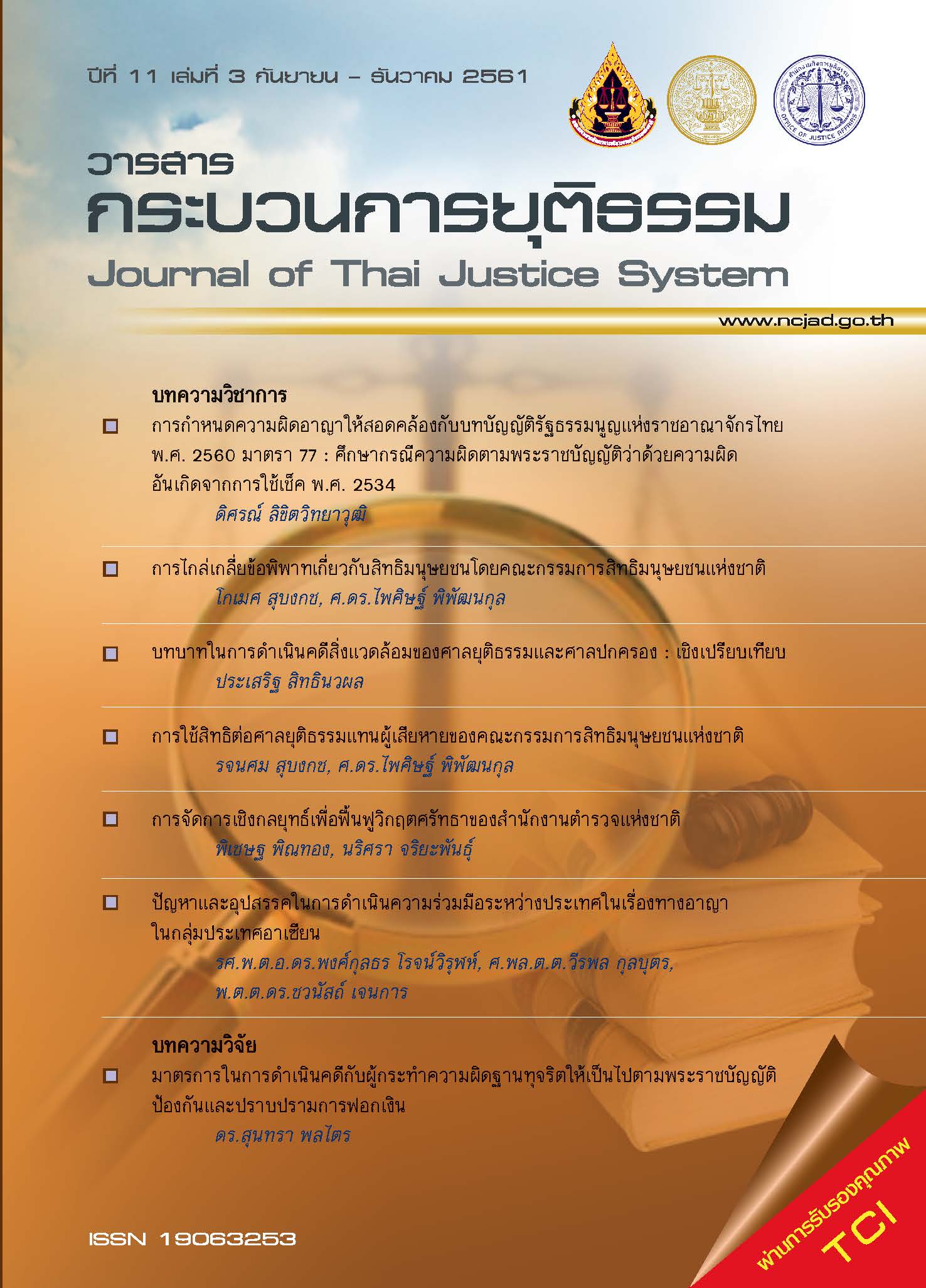การใช้สิทธิต่อศาลยุติธรรมแทนผู้เสียหายของคณะกรรมการสิทธิมนุษยชนแห่งชาติ
Main Article Content
บทคัดย่อ
การใช้สิทธิทางศาลของคณะกรรมการสิทธิมนุษยชนแห่งชาติเป็นอำนาจที่เกิดขึ้นตามรัฐธรรมนูญแห่งราชอาณาจักรไทย พุทธศักราช 2550 โดยให้อำนาจคณะกรรมการสิทธิมนุษยชนแห่งชาติในการเสนอเรื่องพร้อมด้วยความเห็นต่อศาลรัฐธรรมนูญ กรณีที่เห็นชอบตามที่มีผู้ร้องเรียนว่า บทบัญญัติ
แห่งกฎหมายใดกระทบต่อสิทธิมนุษยชนและมีปัญหาเกี่ยวกับความชอบด้วยรัฐธรรมนูญ เสนอเรื่องพร้อมด้วยความเห็นต่อศาลปกครอง กรณีที่เห็นชอบตามที่มีผู้ร้องเรียนว่ากฎ คำสั่ง หรือการกระทำอื่นใดในทางปกครองกระทบต่อสิทธิมนุษยชนและมีปัญหาเกี่ยวกับความชอบด้วยรัฐธรรมนูญหรือกฎหมายและฟ้องคดีต่อศาลยุติธรรมแทนผู้เสียหาย เมื่อได้รับคำร้องขอจากผู้เสียหายและเป็นกรณีที่เห็นสมควรเพื่อแก้ไขปัญหาการละเมิดสิทธิมนุษยชนเป็นส่วนรวม ทั้งนี้ ตามที่กฎหมายบัญญัติ โดยมีวัตถุประสงค์เพื่อให้เป็นหน่วยงานที่สามารถดำเนินการทางศาลแทนประชาชน ซึ่งที่ผ่านมาอำนาจใช้สิทธิทางศาลดังกล่าวมีปัญหาในทางปฏิบัติค่อนข้างมาก เนื่องจากไม่ได้มีกฎหมายที่บัญญัติรองรับหน้าที่และอำนาจดังกล่าวนอกจากที่กำหนดไว้ในรัฐธรรมนูญแห่งราชอาณาจักรไทย พุทธศักราช 2550 โดยเฉพาะกรณีการใช้สิทธิฟ้องคดีต่อศาลยุติธรรมแทนผู้เสียหายซึ่งเกี่ยวข้องกับหลายหน่วยงานไม่ว่าจะเป็นศาลยุติธรรมสภาทนายความ สำนักงานอัยการสูงสุด เป็นต้น เมื่อไม่มีกฎหมายที่กำหนดรายละเอียดอย่างชัดเจนจึงทำให้อำนาจดังกล่าวไม่สามารถใช้ให้เกิดเป็นผลได้จริงในทางปฏิบัติ ดังเห็นได้จากการที่คณะกรรมการสิทธิมนุษยชนแห่งชาติยังไม่เคยฟ้องคดีต่อศาลยุติธรรมแทนผู้เสียหายเลย ประกอบกับเมื่อมีการประกาศใช้รัฐธรรมนูญแห่งราชอาณาจักรไทย พุทธศักราช 2560 พบว่า ไม่มีการบัญญัติถึงหน้าที่และอำนาจในการใช้สิทธิทางศาลของคณะกรรมการสิทธิมนุษยชนแห่งชาติไว้ในรัฐธรรมนูญแห่งราชอาณาจักรไทย พุทธศักราช 2560 แต่อย่างใด ดังนั้น ในปัจจุบันคณะกรรมการสิทธิมนุษยชนแห่งชาติจึงไม่มีอำนาจฟ้องคดีต่อศาลยุติธรรมแทนผู้เสียหายอันส่งผลกระทบต่อสิทธิในการเข้าถึงความยุติธรรมของประชาชนโดยหากพิจารณาจากกฎหมายของหลายประเทศพบว่า มีการบัญญัติให้อำนาจคณะกรรมการสิทธิมนุษยชนในการใช้สิทธิทางศาลไว้ในกฎหมายระดับพระราชบัญญัติและกำหนดรายละเอียดขั้นตอนต่างๆไว้อย่างชัดเจน ดังนั้น หากประเทศไทยมีการบัญญัติให้อำนาจคณะกรรมการสิทธิมนุษยชนแห่งชาติใช้สิทธิทางศาลรวมถึงกำหนดรายละเอียดขั้นตอนการปฏิบัติงานให้เกิดความชัดเจนจะทำให้การคุ้มครองสิทธิมนุษยชนของประชาชนชาวไทยเกิดประสิทธิภาพมากยิ่งขึ้น
Article Details
ต้นฉบับที่ได้รับการตีพิมพ์ในวารสาร เป็นลิขสิทธิ์ของวารสารกระบวนการยุติธรรม แต่ความคิดเห็นที่ปรากฏในเนื้อหาของบทความในวารสารกระบวนการยุติธรรม ถือเป็นความรับผิดชอบของผู้เขียนแต่เพียงผู้เดียว
เอกสารอ้างอิง
ของบุคคล. กรุงเทพฯ : โรงพิมพ์ศาลาแดง จำกัด.
ศนันท์กรณ์ โสตถิพันธุ์. (2558). คำอธิบายกฎหมายลักษณะละเมิด จัดการงานนอกสั่ง ลาภมิควรได้.
กรุงเทพฯ : วิญญูชน.
สำนักวินิจฉัยและคดี. (กรกฎาคม 2555 – ธันวาคม 2555). การศึกษาเรื่องการละเมิดสิทธิมนุษยชน
เป็นส่วนรวม. ประมวลบันทึกความเห็นสำนักวินิจฉัยและคดี ปีที่ 1 เล่มที่ 2.
Birgit Lindsnaes, Lone Lindholt and Kristine Yigen. (2000). National Human Rights Institutions. Articles and working papers. Copenhagen K. Denmark. The Danish Centre for Human Rights.


